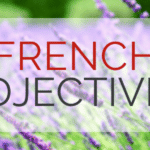
French articles and determiner adjectives (or determiners) modify nouns. Broadly speaking, they give further information about the noun.
Gender and number agreement with French Articles
Articles and determiners have distinct forms according to the gender and number of the noun being modified.
Remember, as with other adjectives in French, these articles and adjectives match the gender and number of the noun they are modifying, not the gender or number of the person or object who owns the noun.
Definite French Articles
The definite articles mean “the” and refer to specific nouns, just as in English. They are:
- Le (masculine singular)
- La (feminine singular), and
- Les (masculine or feminine plural)
For example (and you can learn more about French colors here):
Le chat blanc est dans la boîte noire. (“The white cat is in the black box.”)
Les roses blanches [feminine plural] et les œillets blancs [masculine plural] sont magnifiques. (“The white roses and the white carnations are gorgeous.”)
Both le and la use liaison become l’ in front of words that begin with a vowel or most h’s.
L’avion a atterri très tard et les passagers étaient bouleversés. (“The plane landed very late, and the passengers were upset.”)
Indefinite French Articles
The indefinite articles refer to nouns without specifying which of multiple potential nouns they are applying to.
Un and une mean either “a” or “an“, or literally, “one.”
- Un (masculine singular)
- Une (feminine singular)
The plural form des means “some.”
- Des (masculine or feminine plural)
For example:
Margot a trouvé une ferme abandonnée avec un vieux chien et des voitures délabrées. (“Margot found an abandoned farmhouse with an old dog and dilapidated cars.”)
Partitive French Articles
Partitive articles refer to a piece, or part, being discussed in context of a whole.
- Du (masculine singular)
- De la (feminine singular), and
- Des (masculine or feminine plural)
Similar to the la of the definite articles, de la becomes de l’ in front of feminine nouns that begin with a vowel sound.
Also, note that du is never shortened to d’ (this is how de is shortened, so du needs to remain distinct to be able to tell the two words apart).
For example:
Pour mon petit déjeuner, je mange du beurre et de la confiture avec mon croissant. (“For my breakfast, I eat butter and jam with my croissant.”)
Demonstrative French Adjectives
French demonstratives are even more specific than definite articles and mean “this” or “these“. They are:
- Ce/cet (masculine singular)*
- Cette (feminine singular), and
- Ces (masculine or feminine plural).
*Cet is used for masculine nouns that begin with a vowel sound.
For example:
Cet homme est gentil, mais ces autres sont méchants. (“This man is nice, but these others are mean.”)
Cette fleur a poussé si haut! (“This flower has grown so high!”)
It’s also possible to convey “this” versus “that” noun using the suffix -ci after the “this” object and -là after the “that” object.
For example:
Il a acheté cette montre-ci et elle a acheté cette montre-là. (“He bought this watch, and she bought that watch.”)
Possessive French Adjectives
Possessive adjectives refer to which pronouns have ownership over another noun.
Possessives come in three forms on the singular side: 1) masculine singular, 2) feminine singular, and 3) masculine or feminine plural. On the plural side they only have two forms: 1) singular of either gender and 2) plural of either gender.
- Mon, ma, mes (“my”)
- Ton, ta, tes (“your” familiar)
- Son, sa, ses (“his” or “hers” or “its”)
- Notre, nos (“our”)
- Votre, vos (“your” plural or formal)
- Leur, leurs (“their”)
For example:
Tes enfants sont polis, mais leurs enfants sont impolis. (“Your children are polite, but their children are impolite.”)
Ma mere est partie il y a une heure, mais elle a oublié son sac sur le canapé. (My mother left an hour ago, but she forgot her bag on the couch.”)
Notre but est de déménager et mes parents vont nous aider. (“Our goal is to move and my parents are going to help us.”)
We have more on possessive adjectives and ownership in this lesson.
Interrogative Adjectives
Interrogative determiners mean “which” or “what” noun and are used to request information about the certain noun that is being discussed.
There are four forms of the interrogatives, unlike the other adjectives and articles in this lesson, to agree with both gender and singular/plural forms. They are:
- Quel (masculine singular)
- Quelle (feminine singular)
- Quels (masculine plural), and
- Quelles (feminine plural)
For example:
Quels profs avaient quelles idées? (“Which professors had which ideas?”)
Quel (including all four forms) can also be used in exclamations in which one would say “what a” or “such a” in English.
For example:
Quel film d’horreur terrible! (“What a terrible horror movie!”)
Quelle élève intelligente! (“What an intelligent student!”)



